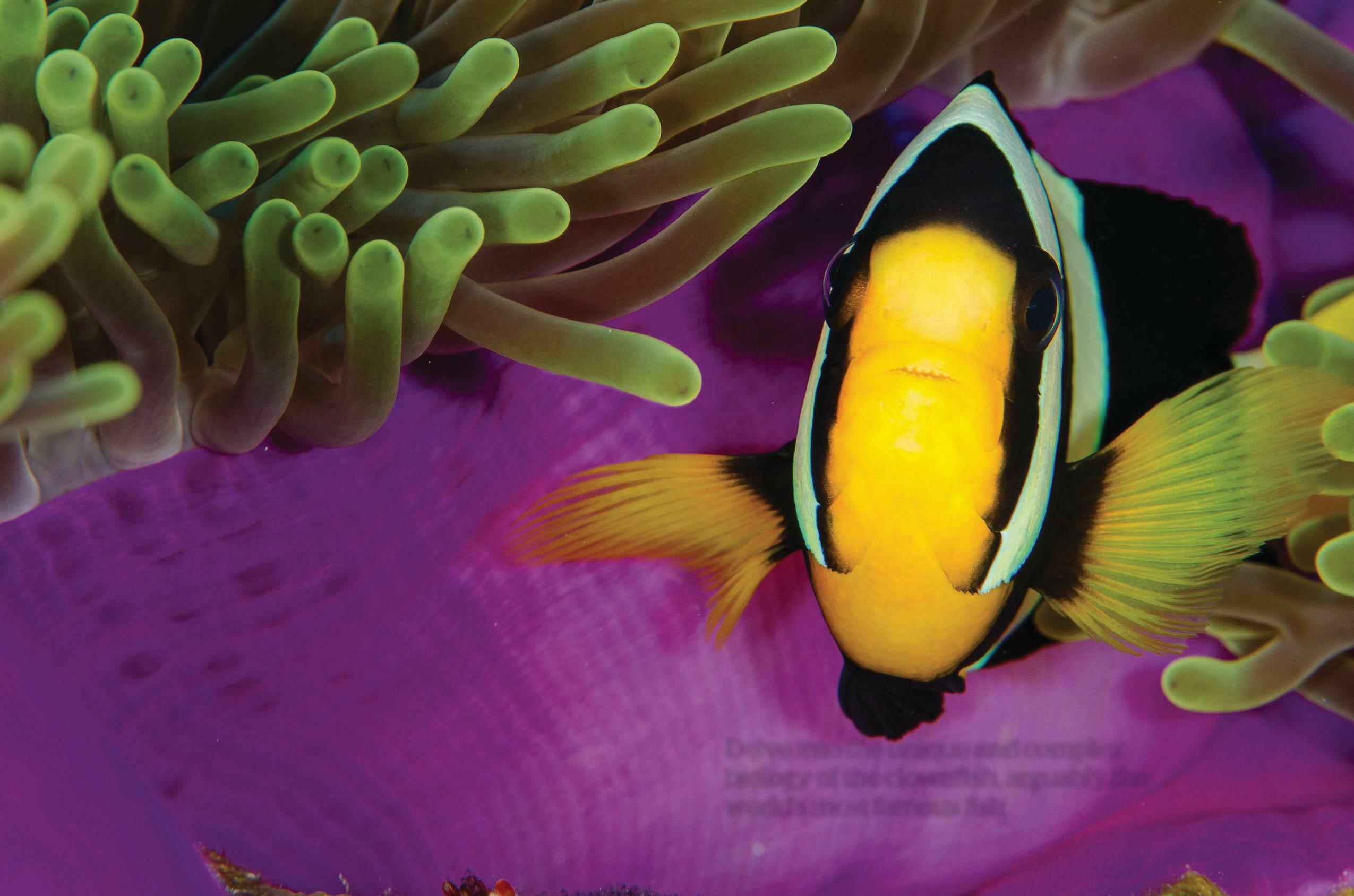IT'S A COLOURFUL LIFE
BBC Wildlife
|June 2024
Delve into the unique and complex biology of the clownfish, arguably the world's most famous fish

As the curtain of bubbles lifts, I find myself in the middle of coordinated chaos, as if I am standing still amidst rush hour at Waterloo Station. Yet instead of angry commuters cursing at my indecisiveness, I am met by flashes of cobalt, crimson, fuchsia, lime green… all streaming past in a three-dimensional fish ballet. The assortment of shapes and patterns is equally bewildering; these creatures seem to be plucked straight out of a child’s picture book.
Straddling the equator, the Maldives archipelago consists of more than 1,000 islands ranging from Malé, the densely populated island capital, to tiny sandbars that are drowned at high tide. Born of volcanic eruptions that have long ceased and settled as 26 atolls, the Maldives is the epitome of paradise, with flour-soft sand, aquamarine waters and palm trees whispering in the breeze. But its true magic lies hidden under the water’s surface, where gardens of coral are home to a multitude of jaw-droppingly vibrant and beautiful species.

I’m here to discover this underwater realm. Rey Gelera, resident marine biologist on Anantara Kihavah, guides me over the reef. As we dive deeper, he points out a small group of familiar, tangerine-hued fish decorated with white vertical bands. They are, of course, clownfish, immortalised in the movie Finding Nemo, which tells the story of a male ocellaris clownfish (Amphiprion ocellaris) who has lost his partner to a barracuda, and his son, Nemo, to the aquarium trade.
This story is from the June 2024 edition of BBC Wildlife.
Subscribe to Magzter GOLD to access thousands of curated premium stories, and 10,000+ magazines and newspapers.
Already a subscriber? Sign In
MORE STORIES FROM BBC Wildlife

BBC Wildlife
"I was terrified the elephant would ram us"
African elephant in Kenya
2 mins
January 2026

BBC Wildlife
ALL YOU EVER NEEDED TO KNOW ABOUT THE Fennec fox
THE FENNEC FOX IS THE SMALLEST fox in the world, with a body length that can be as little as 24cm.
3 mins
January 2026

BBC Wildlife
INTO THE PLASTISPHERE
A unique synthetic ecosystem is evolving in our oceans – welcome to the plastisphere
7 mins
January 2026

BBC Wildlife
“More than half of all animal life exists in a parasitic relationship, and all life lives in symbiosis”
Our survival depends on species evolving to live together - but some relationships take dark turns
7 mins
January 2026

BBC Wildlife
Are animals able to dream?
SLEEP IS A MYSTERIOUS THING. FOR A long time, we weren't sure why we do it.
1 mins
January 2026

BBC Wildlife
Does a cuckoo know it's a cuckoo?
ABSURD LITTLE BIRDS ACROSS THE world lay their eggs in the nests of other species, leaving the hapless parents to raise a changeling at the expense of their own offspring.
2 mins
January 2026

BBC Wildlife
Orcas killing young sharks
Juvenile great whites are easy prey for orca pod
1 mins
January 2026

BBC Wildlife
Ocean goes on tour
Acclaimed film touring the UK, backed by live orchestra and choir
1 min
January 2026

BBC Wildlife
Feisty bats hunt like lions
Winged mammals use a 'hang and wait' strategy to take down large prey
1 mins
January 2026

BBC Wildlife
SNAP-CHAT
Richard Birchett on magical merlins, wily coyotes and charging deer
2 mins
January 2026
Listen
Translate
Change font size

